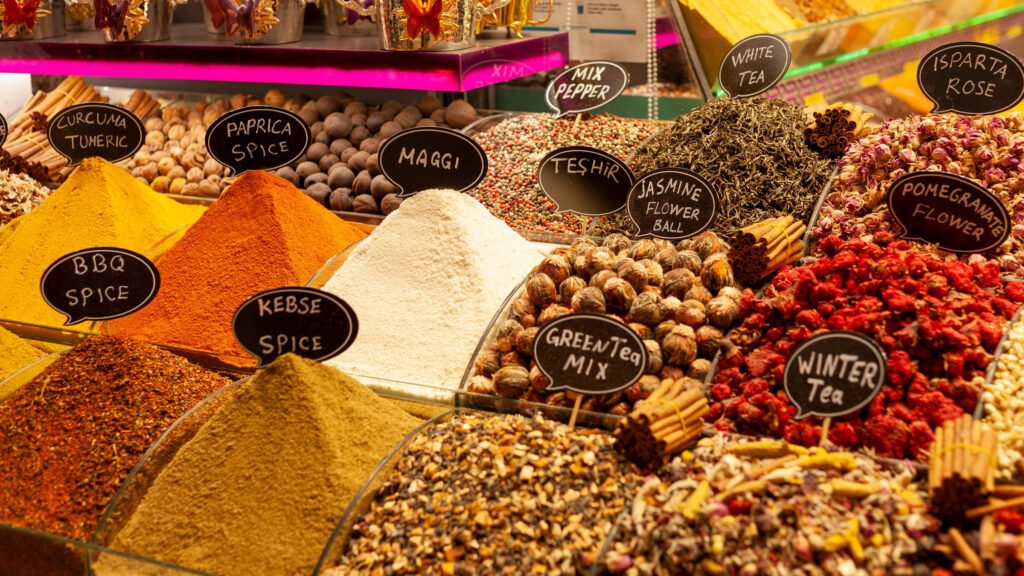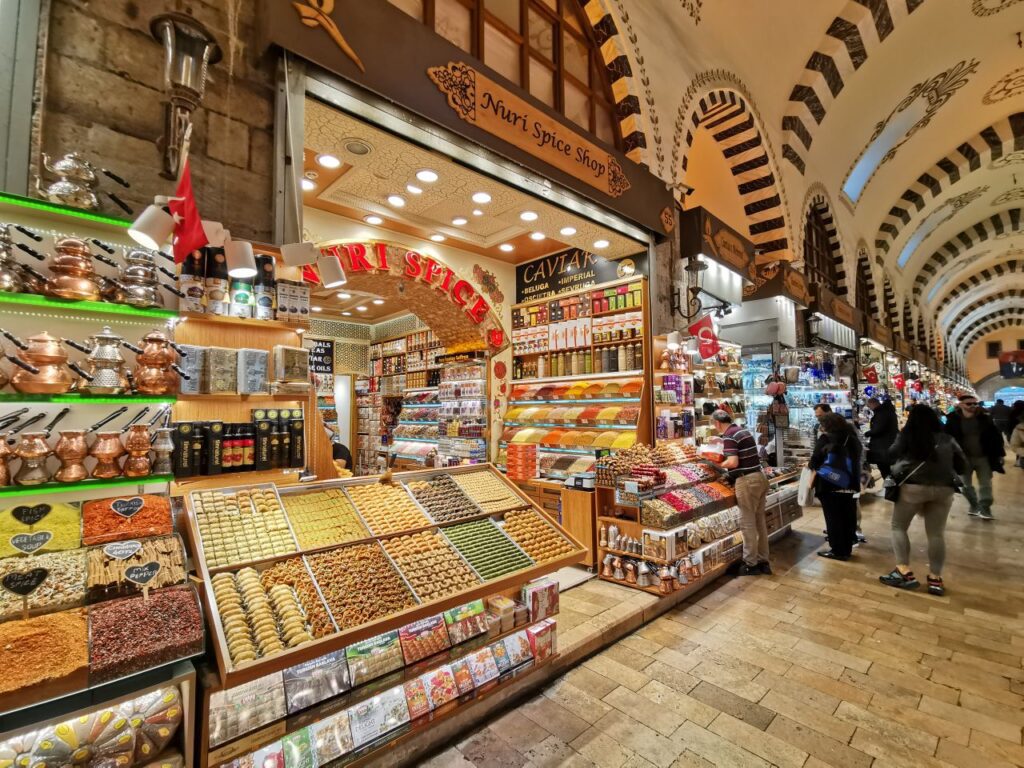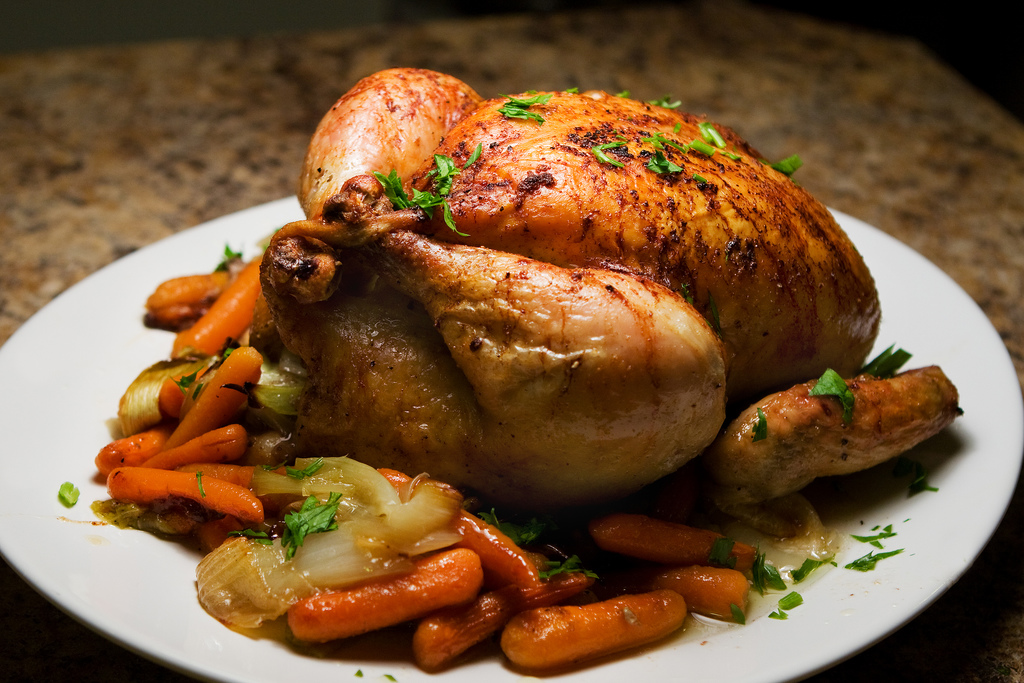Pay Once and Have Free Attractions Entry for 2, 3, 5 or 7 days
Istanbul, the bridge between Europe and Asia, has long been a melting pot of cultures, and its vibrant spice culture is no exception. This comprehensive guide to Istanbul’s spices will take you on a flavorful journey through the city’s history, markets, and cuisine. As you explore the list of Turkish spices and shops where to buy them, you’ll find how you translate them to English, and how to use them at home!
The History of Spices in Istanbul
The history of spices in Istanbul is intertwined with the city’s strategic position on the Silk Road, connecting the East with the West. As merchants and traders passed through Istanbul, they brought a wealth of flavors, which would eventually become integral to Turkish cuisine.
An Enduring Culinary Legacy of Turkish Spices
The importance of spices in Turkish cuisine is evident in the wide array of dishes that showcase their flavors. From fragrant pilafs to spiced meats and aromatic pastries, the Turkish culinary tradition embraces the richness and diversity of these flavors.
Exploring Istanbul’s Spice Markets
The Spice Bazaar (Misir Çarşısı): The Best Spices in Istanbul
The Spice Bazaar, also known as the Egyptian Bazaar, is one of Istanbul’s most iconic markets. Stepping into this historical landmark is an immersion in a world of enticing aromas, vivid colors, and bustling energy. Here, you can find virtually any spice you desire, from rare saffron to piquant red pepper flakes.

Neighborhood Markets and Hidden Gems: Uncovering local treasures
Venture beyond the Spice Bazaar to discover street markets and hidden gems scattered throughout Istanbul. These local haunts offer a more intimate experience, allowing you to explore lesser-known spices, herbs, and blends that might not be found in the larger markets.
💡 Spices make a great gift, and there are many options to choose from in Istanbul. Check out our article on Istanbul gifts for more ideas on what to bring home with you.
Four Tours We Recommend in Istanbul
- Istanbul: Guided Food and Culture Tour: Discover the flavors of Asia and Europe on a food tour of Istanbul. Conquer the cuisines of the city’s 7 hills by following a local to neighborhood cafés for Kurdish food, typical drinks, and more.
- Istanbul: Taste of Two Continents Food Tour: Indulge in fantastic Turkish flavors on a guided walking tour of the best food in Istanbul. Enjoy 9 stops with delicious samples at each one.
- Istanbul: Guided Food Tour of Street Food and Markets: Explore Istanbul’s culinary delights on a guided tour of the vibrant Kadikoy neighborhood. Try authentic Turkish delicacies like creamy kaymak, freshly baked simit, tantalizing fish sandwiches, mouthwatering iskender kebap, and more.
- Bonus: Istanbul: Party Pub Crawl with Party Bus -Enjoy a fun-filled evening with exciting drinking games, complimentary Raki and cocktail shots, and visit three vibrant rooftop clubs on your exhilarating party bus experience.
Don’t Miss The Best Tours and Cruises in Istanbul
Top 15 Spices and Herbs in Istanbul: a List for You
In this section, we’ll explore which spices to buy when you are in Istanbul, the flavor profiles, and culinary uses of 15 quintessential Turkish spices and herbs. From fiery kırmızı biber to the citrusy tang of sumac, this Turkish spices list will ignite your taste buds.
Want to know more about Turkish dishes? Read our article >>
Kırmızı biber (Red pepper flakes)
- Flavor profile: Smoky, earthy, and moderately spicy, red pepper flakes add depth and warmth to dishes without overpowering the other flavors.
- How to use it in Turkish cuisine: Sprinkle on kebabs, stews, or pilafs for a kick of heat, or mix into tomato-based sauces for a subtle smokiness.
Karabiber (Black pepper)
- Flavor profile: Bold, pungent, and slightly sweet, black pepper is a versatile spice that adds a layer of complexity to savory dishes.
- How to use it in Turkish cuisine: Enhance grilled meats, vegetable dishes, and soups with a dash of black pepper, or use it as a finishing touch on creamy yogurt sauces.
Kimyon (Cumin)
- Flavor profile: Warm, earthy, and slightly bitter, cumin imparts a distinctive aroma to a variety of dishes.
- How to use it in Turkish cuisine: Incorporate cumin into spice rubs for grilled meats, add to lentil soups for depth of flavor, or sprinkle on roasted vegetables for a hint of warmth.
Pul biber (Aleppo pepper)
- Flavor profile: Fruity, moderately spicy, and slightly sweet, Aleppo pepper boasts a nuanced flavor that is both versatile and unique.
- How to use it in Turkish cuisine: Use Aleppo pepper in marinades, stews, or salads to impart a touch of fruity spiciness, or mix with olive oil and garlic for a flavorful condiment.
Nane (Mint)
- Flavor profile: Refreshing, cool, and slightly sweet, mint adds a burst of brightness to both sweet and savory dishes.
- How to use it in Turkish cuisine: Sprinkle fresh mint leaves on yogurt-based dips or salads, steep in hot water for a soothing tea, or incorporate into desserts like ice cream and pastries for a touch of freshness.
Sumak (Sumac)
- Flavor profile: Tangy, slightly sour, and fruity, sumac lends a vibrant burst of acidity to dishes without the need for added citrus.
- How to use it in Turkish cuisine: Sprinkle sumac on top of salads, use as a garnish for grilled meats, or mix into rice dishes for a pop of color and flavor.
Safran (Saffron)
- Flavor profile: Delicate, floral, and slightly bitter, saffron imparts a luxurious depth of flavor and a golden hue to dishes.
- How to use it in Turkish cuisine: Steep saffron threads in warm water to create a rich infusion, then incorporate into rice dishes, stews, or desserts for an opulent touch.
Tarçın (Cinnamon)
- Flavor profile: Warm, sweet, and slightly spicy, cinnamon adds a comforting note to both sweet and savory dishes.
- How to use it in Turkish cuisine: Incorporate cinnamon into spice blends for meat dishes, add to baked goods for a touch of sweetness, or sprinkle over hot beverages for added warmth.
Kişniş (Coriander)
- Flavor profile: Citrusy, slightly sweet, and earthy, coriander lends a subtle depth of flavor to a variety of dishes.
- How to use it in Turkish cuisine: Toast whole coriander seeds and grind into a powder for spice rubs, mix into soups or sauces for a hint of citrus, or use fresh coriander leaves as a garnish for added freshness.
Biberiye (Rosemary)
- Flavor profile: Piney, woodsy, and slightly bitter, rosemary adds an aromatic touch to meat dishes and roasted vegetables.
- How to use it in Turkish cuisine: Skewer meats or vegetables on rosemary branches for grilling, incorporate chopped rosemary into marinades, or add to bread dough for a fragrant twist.
Kekik (Thyme)
- Flavor profile: Earthy, slightly minty, and woodsy, thyme complements a variety of meats, vegetables, and grains.
- How to use it in Turkish cuisine: Incorporate thyme into spice rubs for grilled meats, add to soups or stews for added depth, or sprinkle over roasted vegetables for a hint of earthiness.
Defne yaprağı (Bay leaves)
- Flavor profile: Subtly sweet, slightly bitter, and aromatic, bay leaves impart a delicate, background flavor to soups, stews, and sauces.
- How to use it in Turkish cuisine: Add whole bay leaves to simmering liquids to infuse them with flavor, or tuck into rice dishes or casseroles for a subtle hint of sweetness.
Mahlep (Mahleb)
- Flavor profile: Sweet, slightly bitter, and reminiscent of cherries and almonds, mahleb adds a unique touch to sweet baked goods.
- How to use it in Turkish cuisine: Incorporate ground mahleb into dough for pastries, cookies, or sweet breads, or sprinkle over fruit desserts for a fragrant twist.
Çörek otu (Nigella seeds)
- Flavor profile: Slightly bitter, pungent, and nutty, nigella seeds add a crunchy texture and unique flavor to breads and pastries.
- How to use it in Turkish cuisine: Sprinkle nigella seeds over flatbreads, rolls, or savory pastries before baking, or mix into salads for added crunch and depth of flavor.
Anason (Anise)
- Flavor profile: Sweet, licorice-like, and slightly spicy, anise imparts a distinctive aroma to both sweet and savory dishes.
- How to use it in Turkish cuisine: Steep anise seeds in hot water for a soothing tea, incorporate into spice blends for meat dishes, or add to desserts for a hint of licorice-like sweetness.
Tips for Buying and Storing Spices in Istanbul
Buy Pre-Packed Spices
How to buy the best spices in Istanbul, fresh, cheap, and clean? When exploring the aromatic world of spices, it is crucial to consider both quality and safety. One valuable tip is to opt for pre-packed spices over bulk spices, as this ensures a higher level of freshness and hygiene. Bulk spices often sit in open-air markets for several days, exposing them to potential contamination from birds, insects, and environmental pollutants.
On the other hand, pre-packed spices are sealed shortly after processing, which locks in their flavors. These spices are also easier to transport, as the packaging prevents spillage and safeguards the contents from damage during transit.
How to Store Spices
When storing your spices at home, it’s essential to keep them in airtight containers, away from heat, light, and moisture, as these factors can compromise their freshness and potency.
Where to Buy Fresh Spices in Istanbul

While visiting Istanbul, it may be tempting to buy all of the spices you see in the Spice Bazaar or Grand Bazaar. However, it’s important to exercise caution and not be tempted by the abundance of spices that may not be of the highest quality. Here our tips where to find fresh and clean spices in Istanbul.
Look for Spices in Supermarkets
Discovering the world of Turkish spices and herbs can be an exciting culinary adventure. While visiting Istanbul, one might be tempted to explore the famous Spice Bazaar or Grand Bazaar. However, locals tend to shop for spices at supermarkets like Carrefour, where they find high-quality, pre-packed fresh spices directly in-store, making it a more affordable and safe option.
Arifoglu in the Spice Bazaar
Arifoglu, nestled within the vibrant Spice Bazaar in Istanbul, is a true haven for those seeking to immerse themselves in the rich world of Turkish spices. As a purveyor of high-quality herbs and spices, Arifoglu offers a remarkable selection of both traditional and exotic flavors, making it an ideal destination for culinary enthusiasts.
Galata Spice Shop
A visit to the Galata Spice Shop allows you to explore an impressive turkish spices list and turkey spices market offerings, from classic favorites like saffron and sumac to unique blends like the Istanbul spice blend and turkish seasoning. This delightful store is the perfect place to find the best spices to buy in Istanbul and enhance your culinary creations.
Don’t forget about Turkish tea and coffee!
Making the Most of Your Spice Bazaar Visit
Even if you don’t plan on purchasing spices, a visit to the Spice Bazaar in Istanbul is an absolute must for any traveler. This vibrant and bustling marketplace, steeped in history, offers a sensory feast that will delight your eyes, nose, and taste buds, as well as provide a fascinating glimpse into the local culture.
Enjoy Spice Bazaar Guided Tour with Istanbul E-Pass
The Istanbul E-Pass is a valuable option for travelers, as it offers a guided tour to the Spice Bazaar, along with 50+ other attractions, providing a convenient and cost-effective way to explore the city.
Navigating the bustling market
Wandering through the narrow, lively aisles of the bazaar, you’ll be captivated by the colors, aromas, and textures of the countless spices in Istanbul on display. Alongside the vast array of spices, you’ll also find a delightful assortment of other culinary treasures, such as dried fruits, nuts, and traditional Turkish sweets.
Engaging with local vendors and learning about their products
Engaging with local vendors not only enriches your shopping experience but also provides an opportunity to learn about the spices and their uses directly from the experts.
Cooking with Istanbul’s Spices and Herbs
Embarking on a culinary adventure with Istanbul’s spices and herbs is an exciting way to bring the vibrant flavors of Turkey into your kitchen. With a diverse list of Turkish spices to explore, you can create an array of delightful dishes that capture the essence of the city’s rich gastronomic heritage.
Simple Ways to Use Turkish Spices
Don’t be afraid to experiment and incorporate these spices into your everyday cooking, whether it’s adding a dash of sumac to a salad or incorporating cumin into a homemade spice blend.
One enticing way to incorporate Turkish spices into European cuisine is by adding a twist to classic dishes, enhancing their flavors with the vibrant, aromatic seasonings found in Turkey. Here’s an example of how you can fuse these two culinary worlds:
Mediterranean-Turkish Roasted Chicken

Take a traditional roast chicken and give it a Mediterranean-Turkish spin by using a blend of Turkish spices for the marinade. In a small bowl, combine:
- 2 tbsp olive oil
- 1 tbsp ground sumac
- 1 tbsp ground cumin
- 1 tsp ground coriander
- 1 tsp dried thyme
- 1/2 tsp ground allspice
- 1/2 tsp ground cinnamon
- Salt and black pepper, to taste
Mix the ingredients together and rub the spice mixture all over the chicken, ensuring it is well coated. Allow the chicken to marinate for at least 1 hour in the refrigerator, or preferably overnight for a more intense flavor.
Preheat your oven to 425°F (220°C) and place the marinated chicken in a roasting pan. Add some quartered red onions, cherry tomatoes, and bell peppers around the chicken for a burst of color and flavor. Roast for approximately 1 hour, or until the chicken is cooked through and the vegetables are tender.
Serve the Mediterranean-Turkish roasted chicken with a side of couscous or a fresh salad for a delightful fusion of European and Turkish flavors that will impress your guests and transport them to the vibrant streets of Istanbul.
Conclusion: The Richness and Diversity of Istanbul’s Spice Scene
Istanbul’s enchanting spice culture is a testament to the city’s rich history and culinary diversity. By exploring its aromatic markets, learning about its signature spices, and incorporating them into your cooking, you can bring a taste of Istanbul into your own kitchen.
You Might Be Interested in
- Best Food Delivery Apps in Istanbul: How to Order Food In
- Istanbul in May: Weather & Things to Do, Events in 2024
- April Weather in Istanbul: The Ultimate Guide for Travelers (2024)
- How to Make Turkish Coffee: Step-by-Step Recipe
- Explore Maltepe in Istanbul (Asian Side): Things to Do & See, Hotels, Restaurants (2024)
- Traveling in Istanbul with a Baby: Places to See and Tips for a Pleasant Vacation
- Istanbul Ruines and Constantinopol Sites: A Journey Through Byzantine History
- Galata Tower in Istanbul: Entrance Fee, Opening Hours, History & What to See (2024)
- Istanbul Archaeological Museums: Museums, Tickets, Opening Hours (2024)
- 8 Best Taksim Square Hotels in Istanbul from Luxury to Budget (2024)
Don’t Miss The Best Tours and Cruises in Istanbul